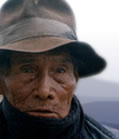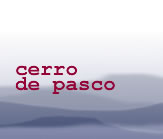THEMES IN THIS
TESTIMONY
Compensation

Conflict

Employment and Income

Justice and crime

Land

Spiritual Beliefs

Click on arrows
to find more
testimonies
featuring
these themes
|
|
Sex
|
male
|
|
|
Age
|
58
|
|
|
Occupation
|
cooperative president
|
|
|
Location
|
Rancas
|
|
|
Date
|
1995
|
|
summary
Julián is a longstanding and dedicated member of the San Antonio de Rancas Cooperative. At the time of the interview he is president.
He describes in fairly vivid detail the history of the way the mines and landowners controlled the area: take-over of community land which forced people into wage-work; abusive treatment of local people; the Rancas campesino uprising. He worked in the mines aged 14 to 18 for the Milpa company and says “they made them work like slaves”. He cites other kinds of institutional discrimination against ordinary people eg the Agrarian Reforms, which forced the community to buy back their land, and the lack of legal protection for small farmers and communities.
He discusses the growth of the cooperative and its role in community and agricultural development. He describes in some detail the cooperative’s participation in the Expo’ 95 exhibition. The interview ends with some discussion on traditional feasts.
detailed breakdown
|
You will need a password from Panos to view the full
transcript of the interview. To apply for a password, click here.
Once you have a password, click here to go to the beginning
of the transcript. You can also click on any section of the
breakdown of content below and go straight to the
corresponding part of the transcript.
|
| Section 1 |
Cerro de Pasco Corp and landowners took over community’s grazing lands forcing campesinos into work in the mines. He worked from age 14 in Milpa mines: “The foremen didn't think twice about us, they used to hit us sometimes because we were children.” Then he went to Lima, returned home at 18 to help his family, when his community members tried to occupy their lands, to take them back from the mining company.
|
| Section 2 |
Vivid/detailed description of Rancas uprising in April (1955?). After a few days, 500 Republican police appeared, let off tear gas, shot and killed several men and women. Animals were also shot. Their lawyer was persecuted.
|
| Section 3 |
Landowners and staff ill-treated children who were shepherds (and their animals).
Estate expansion forced people into working for landowners if they wanted to move their animals from one place to another.
Recovered their land but got little or no good cattle from estate. Cooper corp killed cattle and transferred sheep to Chile, rather than give them to the communities
Gringos (North Americans who ran/owned the mines): inhuman treatment towards non-miners; bad pay and arbitrary dismissal if you worked for them.
In 1969 recovered all lands. Criticises agrarian reform settlement as they had to pay for their own land.
|
| Section 4 |
Solidarity/moral support from miners and Pasco folk were very important at time of uprising.
People returned to Rancas and community grew. Community founded public works farm in 1948 with local cattle - grew to 1,500 quality cattle by 1960. They improved the land and cattle with no technical training. Confrontations with Cooper Corp and no help from authorities. Problem when Yanahuanca community invaded their lands.
|
| Section 5 |
Cooperative achievements: supports education, health and public entities in Rancas.
Community leaders manipulated by Centromin and were selling off great tracts of land at low prices. He became leader of the Cooperative in 1983. Centromin threatened them over the Ocoroyoc land and struggle ensued in Cerro de Pasco and Lima. Community members expected to lose but eventually leaders exacted a deal for 20-year lease of Ocoroyoc lands. He feels it's too little and that Centromin won't honour agreement to return land in original condition. No conflict now with Centromin but general complaint about water pollution
|
| Section 6 |
First task for community is to look after the soil – basis of profitable farming
Expo’ 95 farming exhibition - 150 organisations taking part. Expo’ 95 is a collective effort with four main organisations (including the Cooperative), contributing 12,000 soles. Criticises breaking up of cooperatives as leads to land-shortage and cites examples. Their cooperative makes enough to share out a small surplus amongst members and pay taxes and legal duties.
|
| Section 7 |
Young people generally migrate and don't worry about the town's future
Description of making jora (maize) beer for the San Antonio de Padua’s feast. Lists of other feasts. Description of animals' feast and taking table offerings to the “grandfather mountain”. “For us, it's important to be in harmony with the animals and the land…. if something happens like animals go missing, Grandfather must be complaining about something.” |
|


